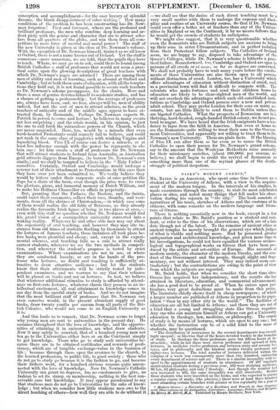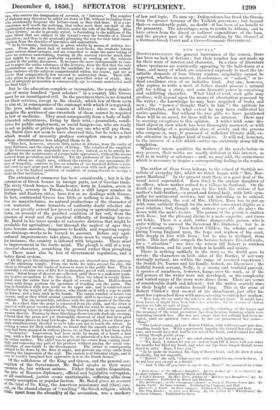BAIRD'S HODERN GREECE. * MR. BAIRD is an American , who spent
some time in Greece as a student at the University of Athens, with a view to the acquire- ment of the modern tongue. In the intervals of his studies, he made excursions through the country, to visit its most celebrated places or sites, and noted many things that fell under his obser- vation during his sojourn in ' the city." The book consists of narratives of his tours, sketches of Athens and the customs of its citizens, with some remarks on the modern language and litera- ture of Greece.
There is nothing essentially new in the book, except in a few points that relate to Mr. Baird's position as a student and resi- dent, or refer to the time of his observations, which are of a late date though not of the latest. To the remains of ancient cities or ancient temples he merely brought the general eye which judges of what is visible and nothing more. Had he possessed greater antiquarian and architectural knowledge, and green more time to his investgations, he could not have equalled the various archeo- logical and topographical works on Greece that have been pro- duced by the artists and art-critics of Europe. His accounts of modern society, the character of the modern Greeks, and the con- duct of the Government and the people, though slight and frag- mentary, are not without interest. They may indeed seem con- tradictory ; but the contradictions are owing to the point of view from which the subjects are regarded. Mr. Baird holds, that when we consider the short time since Greece has acquired her independence, and the results she has attained in literature, education, and commercial advancement, she has a good deal to be proud of. When he enters upon par- ticulars, very great deductions must be made from this praise. The literature chiefly shows itself in cheap newspapers ; of which a larger number are published. at Athens in proportion to its popu- lation " than in any other city in the world." The facilities of education are all but limited to Athens ; and there they are not of a kind that a young and struggling state like Greece requires. Any one who can maintain himself at Athens can get a University education in theology, law, medicine, or philosophy. The course of study is by means of lectures, which are open to any one; but
i whether the instruction can be of a solid kind to the mass of students, may be questioned.
" The distribution of instructors in the several departments was exceed- ingly unequal ; as likewise that of the hours devoted weekly to the branches of study. In theology the three professors gave but fifteen hours of in- struction; while in law there were elevenprofessors and upward of forty
lectures, in medicine twelve professors and sixty and seventy lec- tures, and in philosophy and the kindred studies twenty professors and eighty-two lectures. The total number of lectures delivered within the compass of a week was consequently more than two hundred, embracing every department of science and art. There is a similar inequality with re- spect to the apportionment of students in attendance. Of 397 regalF1 matriculated students during a previous year 242 were studying medicine, 86 law, 62 philosophy, and only 7 theology . And though the number had now increased to 455, the same inequality was still observable. Besides these students who were inscribed on the books, and who expected to pursue a regular course of study, (the pluetetce,) there were at least three hundred more attending certain branches with greater or less regularity for a year or • Modern Greece : a Narrative of a Residence and Travels in that Cowgirl; with Observations on its Antiquities, Literature, Language, Polities, and Belifiloo. By Henry M. Baird, Ma. Published by Harper Brothers, New York. two, who receive the designation of acroata, or ' listeners.' The number of students may therefore be safely set down at 750, without including those who occasionally frequent the lecture-room as they find time. It is a cir- cumstance well worth the noticing, that rather more than one-half of the matriculated students are from districts under the rule of the Sultan. Thus Free Greece' as she is proudly styled, is furnishing to the millions of the same blood that are subject to the tyrant's sway the benefits of a liberal education; and thus is she gradually preparing the way for their total eman- cipation from the shackles of • orance and superstition. cl'it As in Germany, instruction is given wholly by mans of written lec- tures. From the great lack of suitable text-books, the :students labour under serious disadvantages, and are compelled to make the mere taking of notes an arduous undertaking, wasting in the manual exercise much time that might be far more profitably expended in reading on the subjects treated in the public discourses. It becomes the more indispensable to com- mit to paper the entire substance of the lectures, from the fact that the only examinations are those to which the candidate for a degree must submit. They embrace all the subjects comprehended within the course, and are so severe that comparatively few succeed in undergoing them. Their diffi- culty arises in part from the want of any prescribed order of study. Any lack of adequate preparation is consequently apt to remain undetected until the final trial."
But be the education complete or incomplete, the yearly demis- sion of many hundred "poor scholars " in a country. like Greece must be an unmitigated evil. In the provinces there is no demand for their services, except in the church, which few of them seem to aim at, in consequence of the contempt with which it is regarded. The poor scholars must remain at Athens ; where we should imagine the services of one-twentieth of them cannot be required in law or medicine. They must consequently form a body of half- educated adventurers, living by their wits,—journalists, candi- dates for public employment, or social hangers-on, who are ready to act as public or private agents for any one who will pay them. 31.r. Baird does not seem to have observed this, but he notes a fact which would of necessity produce corruption among a people whose circumstances less adapted them to it.
"This fact, however, attracts little notice at Athens, from the rarity of large fortunes, and the simple style of living. The salaries of the employes of the Government are singularly low—so low, indeed, as to be utterly m- sufficient for the maintenance of a respectable appearance, without the means derived from peculation and bribery. Yet the professors of the University, most of whom are single men, without the exercise of any uncommon de- gree of frugality, contrive to live on salaries of six hundred dollars a year, and even to save some part of that sum ; and even with such paltry emolu- ments, it is the highest ambition of numbers of young Greeks to occupy a chair in that institution."
The extension of commerce has been considerable ; but it is the extension of Greek houses in foreign parts, not of Grecian trade. The sixty Greek houses in Manchester, forty in London, seven in Liverpool, seventy in Trieste, besides a still larger number in Italian and Eastern cities, have few or no dealings with Greece. In fact, continental Greece has little or nothing to deal in. She has no manufactures, no natural productions of the character of raw material. Some botanists of authority doubt whether she can ever greatly extend her present grazing or agricultural opera- tions, on account of the parched condition of her soil, from the absence of wood and the practical difficulty of forming forests. Mr. Baird in his tours speaks of extensive districts that might be available for agriculture ; but through the neglect of ages they have become marshes, dangerous to health, and requiring expen- sive drainage-works to be turned to account. Before any agri- cultural improvements take place, there must be rural security : for instance, the country is infested with brigands. There must be improvement in the rustic mind. The plough is still of a very classical character, scratching the ground rather than ploughing it. There must also be less of Government regulation, and a better fiscal system. "All the great threshing-floors of Athens are situated near this gateway and the adjoining temple. From the fields for miles around the city, the wheat is brought on the backs of horses or asses to the public floor. This is generally a circular area of fifty feet in diameter, paved with common rough stones. Great heaps of sheaves are collected, until there is a sufficient quan- tity to give occupation to the threshers. Then the wheat is evenly distri- buted over the entire floor to the depth of several inches. Half-a-dozen horses with drags perform the operation of treading out the grain. The drag is furnished with iron teeth on its upper side, and is rendered more effective by the weight of the driver, who stands on it with a rope to guide his horses, and a long stick in his hands. The entire number of horses run abreast, and as they whirl around considerable skill is necessary to prevent collision. The air, meanwhile, reechoes with the merry shouts of the thresh- ers. In a short time the grain is separated from the stalk, and the straw is removed with great wooden pitchforks. Should the wind be strong enough, the remaining wheat is winnowed by being thrown into the air by means of wooden shovels. Passing by these threshing-floors towards dusk one evening, I found that the grain not yet thoroughly cleansed of chaff had been piled up in various places in long low heaps. As we approached, two or three pea- suits simultaneously shouted to us to take care not to touch the wheat. In seeking a cause for their solicitude, we found that the smooth surface of the heap had been stamped in various places, or, as they said, it had been sealed —` boulonetai.' Impressions had been made by means of a board a foot long, with a few letters deeply cut into it, at intervals of a few inches, over the entire surface. The object was to prevent the owner from coming steal- thily and removing any part of his produce without paying the usual con- tribution of one-tenth to the Government. The owner is consequently obliged to lie down by the floor at night, and prevent any stray cattle from marring the impression of the seal. The custom is of Oriental origin, and it may be readily imagined how oppressive it is to the Greek farmer." Of the selfishness of the King and Queen, and the general cor- ruption of the Government, Mr. Baird speaks as their worst enemies do, but without animus. Either from native disposition, the arts of Russian diplomacy, official and legislative corruption, or all combined, justice seems unattainable, suffering alike from courtly corruption or popular faction. Mr. Baird gives an account of the trial of Dr. King, the American missionary and (then) con- sul, on the absurd charge of " reviling " the Greek religion ; which trial, apart from the absurdity of the accusation, was a mockery
of law and logic. To sum up : Independence has freed the Greeks from the grosser tvranny of the Turkish governors ; but beyond that—a considerable point, no doubt—it has been of no benefit to the peasantry. The advantages seem to centre in Athens, and to have arisen from the direct or indirect expenditure of the loan, and the greater part of the annual taxation, by the channel of a German-Greek Court and a Greco-Germanic Government.

































 Previous page
Previous page